Tamil Nadu: The Game of Votebank Consolidation
Note: The original version of the article was published on January 27th in “The Daily Guardian”.
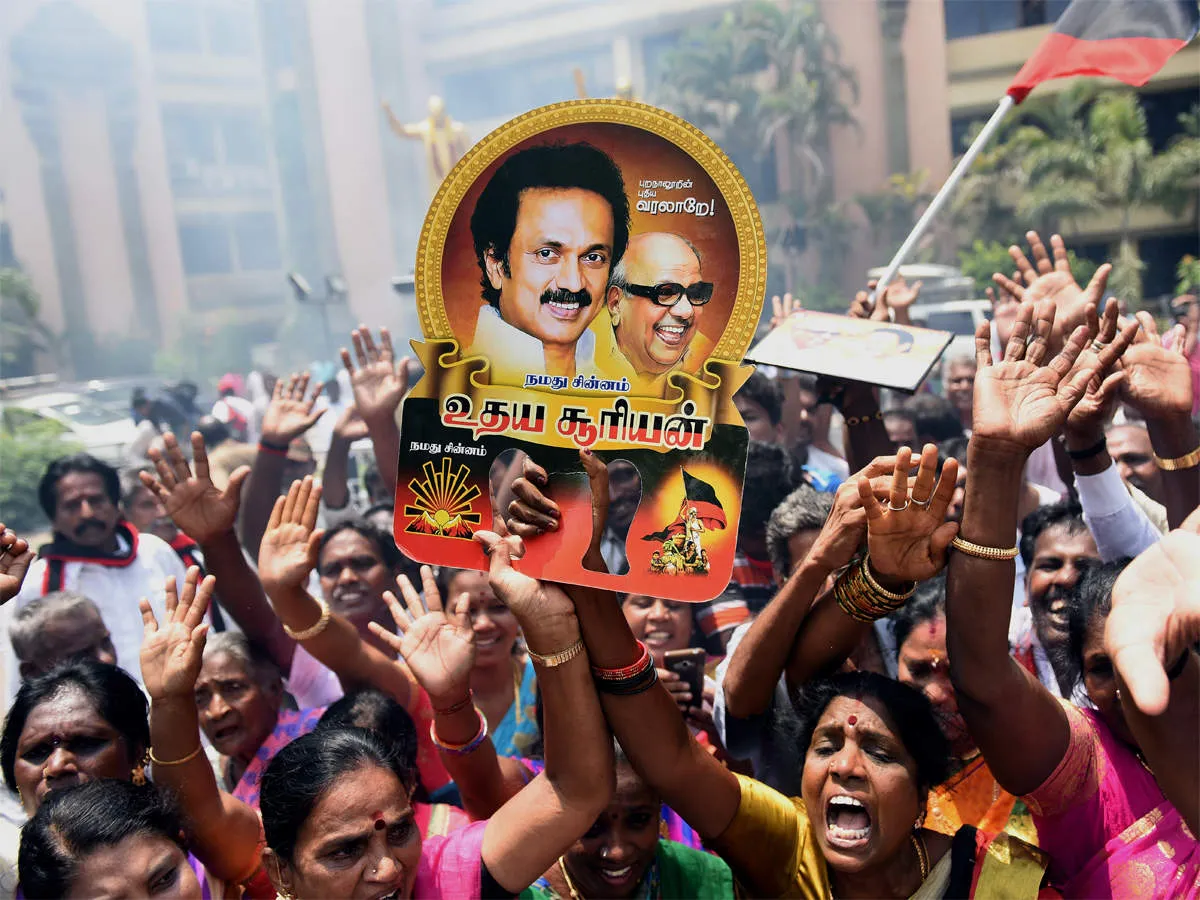
As party leaders and political influencers have taken to the streets of Tamil Nadu for the upcoming assembly elections, we have been seeing more aggressive back and forth between the All India Anna Dravida Munnetra Kazhagam (AIADMK) and Dravida Munnetra Kazhagam (DMK) alliances take place. AIADMK's 'Vetrinadai Podum Tamilagam' (Tamil Nadu marches on victoriously) slogan is one that positions the DMK as one that opposes democracy with violence while DMK president MK Stalin has launched a pro-development, 100 day promise which would take petitions from the citizens and solve major problems without 100 days of being voted to power. In support of these efforts, their national alliance parties Bharatiya Janata Party (BJP) and Indian National Congress (INC) have also taken to the streets. As per our last edition, BJP's former president Amit Shah was to visit Chennai but was replaced by party president J. P. Nadda who visited Pongal celebrations in Chennai at the same time as RSS chief Mohan Bhagwat. On the other hand, INC leader Rahul Gandhi kickstarted the party's campaign via a three day visit to Tamil Nadu aggressively speaking against the BJP and RSS, speaking in favour of the importance of the state's youth in the future of Tamil Nadu.
While historically, the primary fight in the state has been between the AIADMK alliance and the DMK alliance, BJP's aim is to disrupt that and become a primary player in the state. This is in line with their strategy in other states as well as they've been leaving behind their allies.
Two-Faced Contest in Tamil Nadu: AIADMK vs DMK
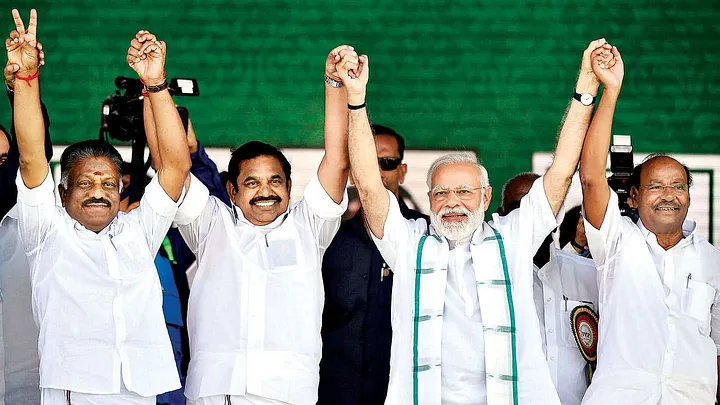
In the past week, dominant regional and national parties have embarked on the campaign trail in Tamil Nadu. The Assembly polls in Tamil Nadu are set to be held in April or May this year, and the Election Commission has released the final electoral rolls for the state already. As per the final electoral rolls released by the Election Commission, there are 6.26 crore voters in the state and there are 10 lakh more women voters than men. In the past, politics in the state has always been dominated by regional parties such as the AIADMK and the DMK.
Currently, the political battle in Tamil Nadu is a two-faced contest between the AIADMK led National Democratic Alliance (NDA) and the DMK led United Progressive Alliance (UPA). Incumbent Chief Minister, Edappadi K. Palaniswami of the AIADMK is leading the NDA alliance along with its alliance partners, the BJP, Pattali Makkal Katchi (PMK) and other partners. While on the other hand, DMK supremo M.K. Stalin is leading the UPA along with alliance partners the INC, Indian Union Muslim League (IUML) and others. While voters in Tamil Nadu were eagerly waiting for the emergence of a third front, due to the impending announcement of actor Rajinikanth's political party, the actor officially announced his decision to not launch a political party last month.
Current Political Climate in Tamil Nadu
As Rajinikanth backs out from forming a party, the political contest in Tamil Nadu has continued to remain a two-faced contest between the AIADMK and the DMK. However, unlike before, the 2021 Assembly Elections would be the first one in decades without J. Jayalalithaa and M. Karunanidhi. Due to the same, more emphasis is being given to the leadership capabilities of current Chief Minister and AIADMK top brass Edappadi Palanisamy and DMK Supremo M.K. Stalin.
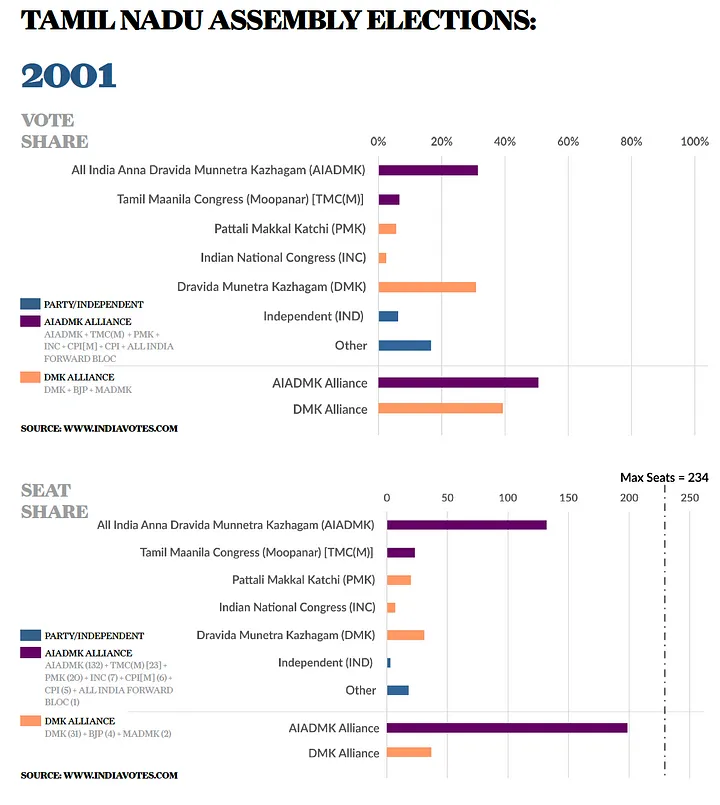
A number of other parties such as Kamal Hassan's Makkal Needhi Maiam (MNM), Seeman's Naam Tamilar Katchi (NTK) may not make an electorally significant difference. At this juncture, the performance of National parties should be viewed more closely given the momentum gained by the BJP and deterioration of the INC in Tamil Nadu. Tamil Nadu has always been a state where National parties piggyback on the stature of regional parties. This time though, the BJP seems to have a slight upper hand in controlling their alliance with the AIADMK whilst the INC is still completely dependent on the DMK.
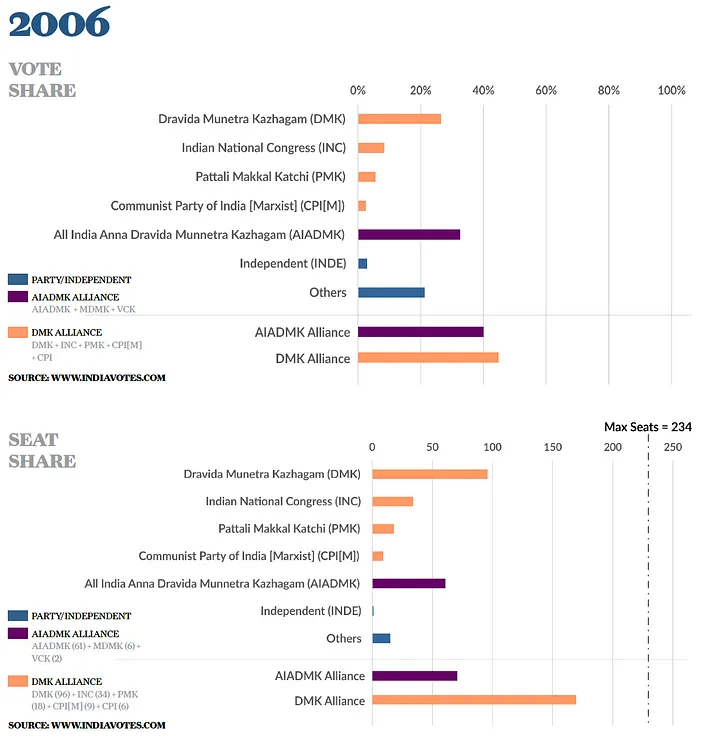
The AIADMK which was marred by the issue of 'twin leadership' seems to have ironed it for now. The incumbent Chief Minister Edappadi K. Palaniswami and Deputy Chief Minister O.Panneerselvam have been at loggerheads about absolute control over the party. The party, however, has officially decided to project Edappadi K. Palaniswami as their Chief Ministerial candidate and there has been a temporary detente between them. Edappadi Palaniswami has come a long way as a leader since his inception as the Chief Minister. He has formed a niche of his own. A farmer himself, Palaniswami has been applauded for his actions such as pushing the Kudimaramath initiative aimed at restoring and rejuvenating water bodies and naming 8 Cauvery Delta districts as Protected Farm Zones amongst others.
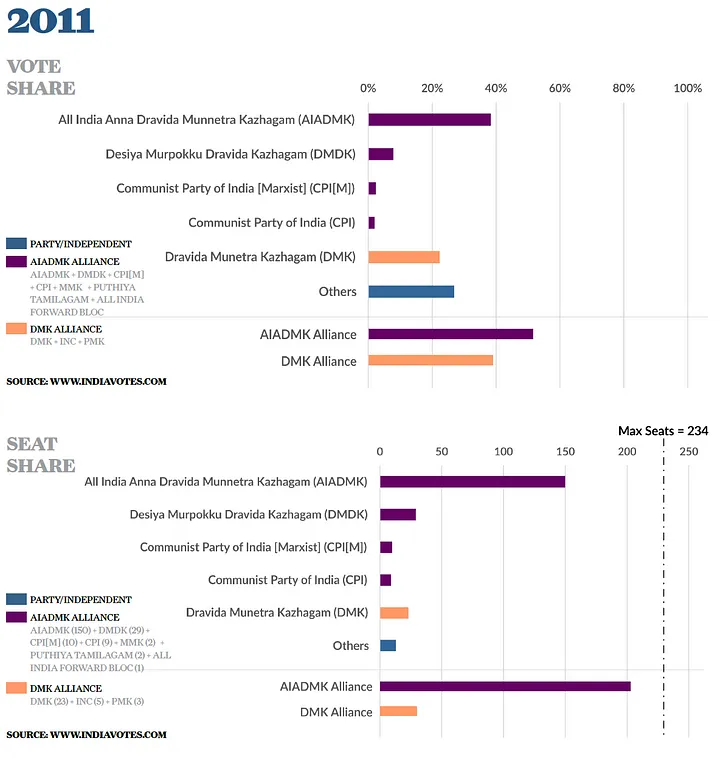
The DMK on the other hand has one undisputed leader in M.K.Stalin whose oratory and leadership skills have more often than not been targeted by opposition and people alike. His decision to appoint his son Udhayanidhi Stalin as the head of DMK's Youth Wing was seen as a dynastic move and irked the party's own cadre. On the other hand, DMK is currently riding on a 10-year anti-incumbency wave that has been culminated by the AIADMK in the state. Peoples' positive perception of the BJP in Tamil Nadu is also another optimistic sign for the AIADMK-BJP alliance. These two factors have primarily strengthened DMK's chances for the upcoming 2021 Assembly Elections. As per an opinion poll released by the ABP Network and Team C-Voter, the DMK led UPA alliance is leading in the state with a 41.1% vote share (158-166 seats) and the AIADMK led NDA alliance is likely to secure 28.7% vote share (60-68 seats).
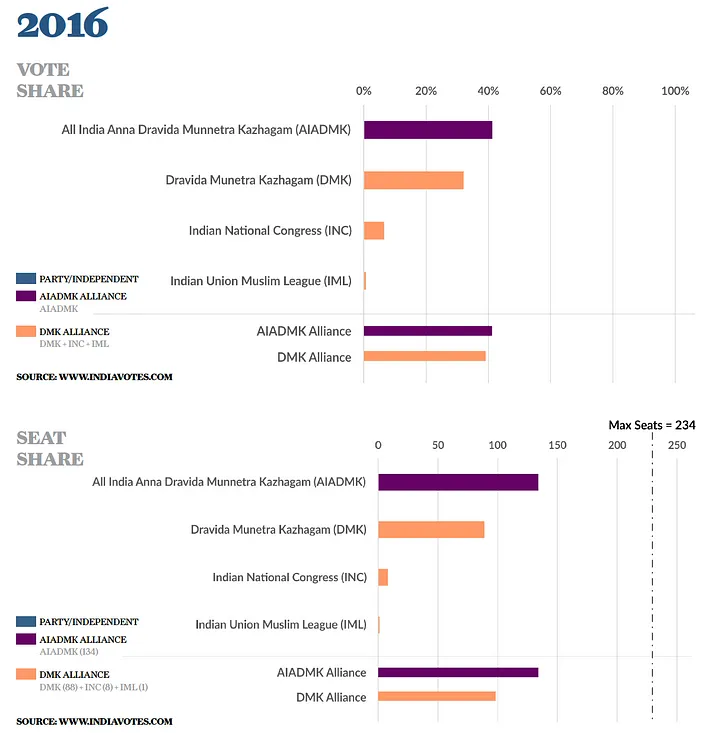
Which caste groups will vote for the DMK AIADMK?
The AIADMK at present banks on its strongholds in districts such as Salem, Coimbatore, Theni, parts of Dharmapuri and Krishnagiri. DMK on the other hand is focusing on its traditional strongholds but also on AIADMK's strongholds in the state. The DMK launched its campaign from Salem which shows that their primary focus is on the Western belt where the Gounder community dominates political discourse. Chief Minister Edappadi K. Palaniswami, who is a Gounder himself is currently the pride of the community as he is the first ever Gounder Chief Minister. However, this does not mean that the AIADMK will be able to electorally consolidate the entire community. The DMK is trying to win over the section of the Gounder community that the AIADMK is not able to consolidate.
As the Gounders dominate the Western belt, there is another community that can not be left out: the Vanniyars, which is the largest community in Tamil Nadu. For decades, the regional parties have been trying to appease them. For instance, DMK Chief M.K. Stalin announced that one of his poll promises would be to establish a quota for the Vanniyars within the 20% reservation for Most Backward Communities (MBCs). The Vanniyars constitute 75% of the MBC list. The Pattali Makkal Katchi (PMK) led by Dr. Ramadoss is often termed as a Vanniyar-based political party. However, the previous elections have shown that the vote of the Vanniyar community is not consolidated to one particular party and is split in places such as Dharmapuri and Krishnagiri.
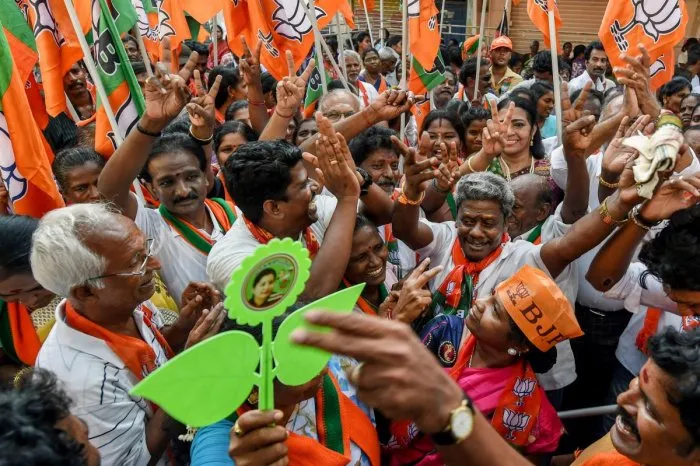
Another important community in Tamil Nadu is the Dalit community, especially the Paraiyars. They are the biggest group within the state's Scheduled Caste community. Viduthalai Siruthaigal Katchi (VCK) under its Chief Thirumavalavan has become the most prominent pro-Dalit party in the state. They are capable of consolidating a major chunk of Paraiyar votes in North Chennai and certain districts of the Western belt. Having the VCK as an alliance partner has strengthened DMK's fight for 2021. The Arundhathiyars -a prominent Dalit community- are based mostly in the Western and Nothern belts in the state. The BJP's State Secretary L. Murugan hails from this community and many political commentators view his appointment as a strategic move from the BJP.
The Mukkukathor community, which is primarily based in Theni district has historically supported the AIADMK. This is also the home district of Deputy Chief Minister and AIADMK leader O.Panneerselvam. Andipatty Assembly Constituency in the district has been an AIADMK stronghold, and both former Chief Ministers and AIADMK Supremos
M. G. Ramachandran and J.Jayalalithaa have won from the constituency. However, in 2019 during the by-elections and due to the split in the AIADMK and the formation of the Amma Makkal Munnetra Kazhagam (AMMK), the then incumbent MLA Thangatamizhselvan (formerly from the AIADMK) stepped down to join the AMMK. Currently, Thangatamizhselvan has joined the DMK and is poised to be their strongman in the constituency. The Mukkulathor (Thevar) vote bank may scatter, but will remain a critical one for the AIADMK as they have historically been known to vote en masse.
In a similar manner, the Mudaliyar community has historically been supporting the DMK.
They have not been as politically prominent as the Mukkulathors but their presence in Northern districts such as Tiruvallur, Kancheepuram, Thiruvannamalai is critical for the DMK.
The National parties have a considerable presence in Tamil Nadu's southern districts. The Nadar community is prominent in these districts and the BJP and INC both have a sizable support base within the community. BJP's former Central Minister Pon Radhakrishnan is from Kanyakumari and he commands a huge support base here. However, post the 2019 Lok Sabha elections, his electoral prospects have stayed inactive. Former Member of Legislative Assembly (MLA) and AIADMK member, Nainar Nagendran is currently the face of BJP in Tirunelveli district. The INC also has a sizable support base amongst the Nadar community. The late H. Vasanthakumar who died as an incumbent MP of Kanyakumari commanded great respect amongst both the Hindu Nadars and the Christian Nadars. This paved way for his comprehensive victory in the 2019 General Elections.
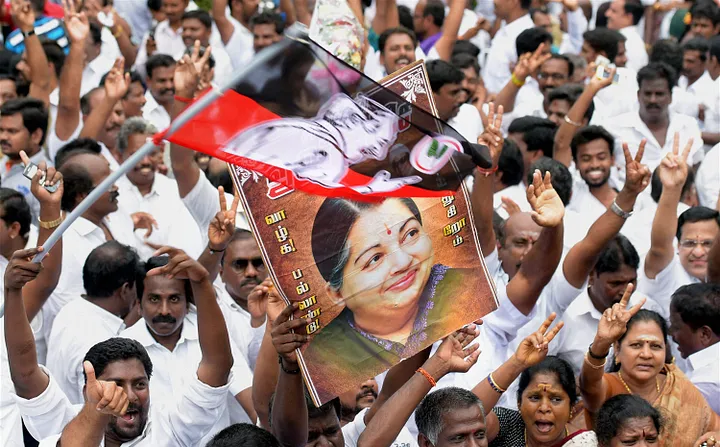
In the 2016 assembly elections, the AIADMK was elected to power for a second time, with a slightly reduced majority, winning 134 seats out of the 235. The AIADMK led alliance managed to secure 41% of the votes, while the DMK led alliance secured roughly 40% of the votes and 90 seats. The AIADMK repeated its record of being the only party to be re-elected in the state. In the upcoming elections, parties are leaving no stone unturned to appease voters. While incumbent Chief Minister Edappadi K. Palaniswami has promised concrete houses to voters, M.K. Stalin has promised to waive all farm and jewel loans. On the other hand, Kamal Hassan, in an attempt to attract women voters has promised to pay a salary to housewives.
Historically, Tamil Nadu elections have always been a two-pronged contest between the AIADMK and the DMK, and while many thought the 2021 polls would be different, they have turned out to be the same battle, with different faces. While in the past the AIADMK has successfully overturned an anti-incumbency wave against itself, it remains to be seen whether they will be able to do the same this year as well.
